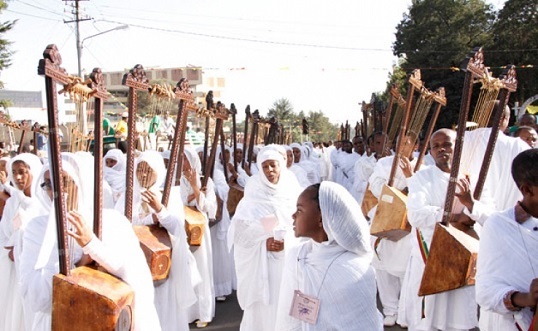In John 12, we find a curious incident where, just like at Jesus’s baptism, a thunderous voice speaks audibly and loudly from heaven. Why? It comes as answer to Jesus’s own question. A question that turns out to be rhetorical, as he explains afterwards.
“Now My soul is troubled, and what shall I say? ‘Father, save Me from this hour’? But for this purpose I came to this hour. Father, glorify Your name.”
Then a voice came from heaven, saying, “I have both glorified it and will glorify it again.”
Therefore the people who stood by and heard it said that it had thundered. Others said, “An angel has spoken to Him.”
Jesus answered and said, “This voice did not come because of Me, but for your sake.
-John 12:27-30
“Father, glorify you name!”
“Son, I already have, and I’ll do it again.”
“Yeah, I know. But these folks around here don’t know, so thanks for saying something they could hear.”
The voice is not answering for the sake of the asker, but for the sake of others – the listeners in, the eavesdroppers, us. Divine revelation is of no use sealed up. What good is it to simply know there exists a locked briefcase filled with secrets? That the briefcase contains love letters is of far more interest.
So we find the same thing when Jesus speaks to John at the beginning of Revelation.
I [John] was in the Spirit on the Lord’s Day, and I heard behind me a loud voice, as of a trumpet, saying, “I am the Alpha and the Omega, the First and the Last,” and, “What you see, write in a book and send it to the seven churches which are in Asia.
-John 1:10-11
John is seeing a vision. Nobody else can see it. So what does Jesus tell him to do from the get go? Write everything down. He is commanded to take notes, digest it, make copies, and mail it to a bunch of people. Why? For their sake, so they can share in the vision too.
Why did Jesus go through just John to deliver this particular (and very important) message? There are of course other ways he could have gone about it. He could have come to each of the local church leaders in turn, delivering them all the same message. He has plenty of time after all, being eternal. He could have also taken this to it’s logical end and had the holy spirit deliver the vision to every Christian on earth.
Your sons and your daughters shall prophesy,
Your young men shall see visions,
Your old men shall dream dreams.
– Joel 2:28 and Acts 2:17
OK great, so why not THIS dream then? I will take a stab at answering that. I think it was probably for consistency’s sake – so conflicting and muddled accounts were not produced. It was also for authority’s sake. Divine revelation involving locals would naturally come to the locals. Prophecy involving the fate of the whole earth and human race should come not to every local, but to a figure of authority capable of being taken seriously by all – the last living apostle.
And so we have John’s Revelation, well-preserved for us today, contemporary visions of heaven notwithstanding. It’s written down for our sake.
I think so much more is for our sake too. Flowers are beautiful and diverse primarily to relay information of his creative genius. The scripture is preserved for our sake – not because HE needs paper and ink, but because we do. We love things we can hold in our hands. He even gives us parents and lovers, that we might know something (however obscured) of his ways, and even enter into some temporary and tainted knockoff of his Trinitarian communion. He makes this possible too, for our sake.

